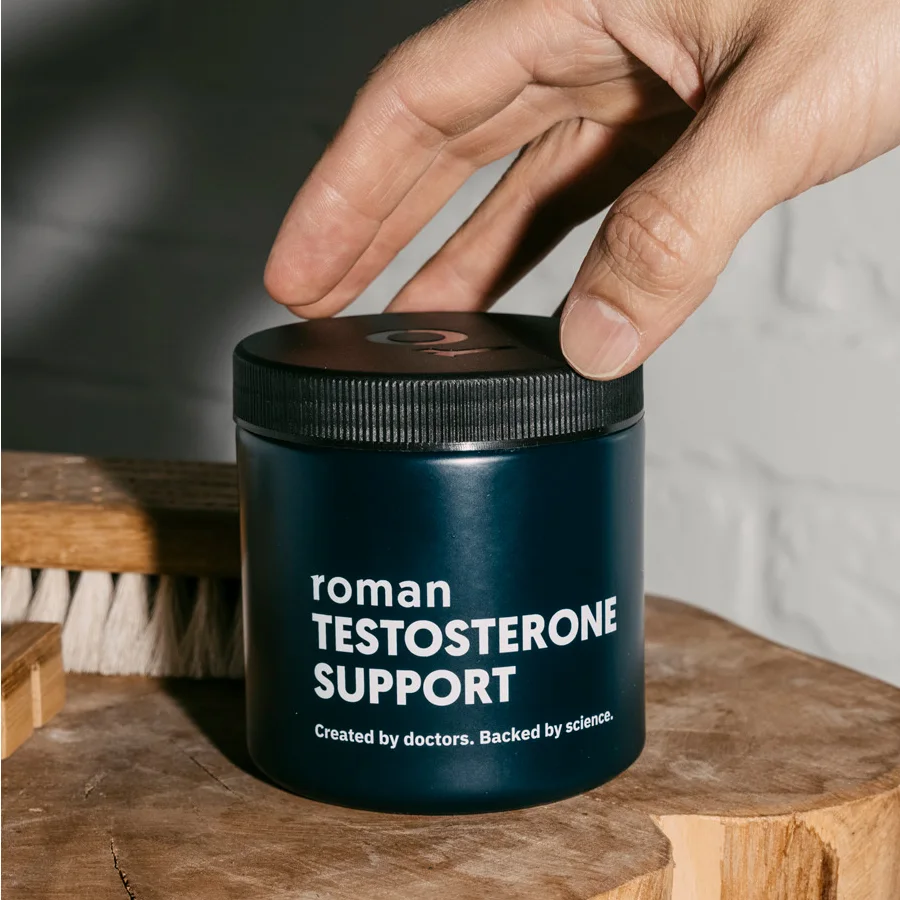Here's what we'll cover
Here's what we'll cover
Here's what we'll cover
If you’re interested in maintaining your hormonal levels, you might wonder if there are certain foods that kill testosterone. After all, testosterone naturally decreases with age, so it’s understandable to consider other ways to support it. In addition to maintaining a healthy body weight and regularly exercising (among other strategies), focusing on the food you do and do not eat can also help you maintain optimal testosterone levels.
Keep reading to learn more about how your diet can affect your hormones and what foods kill or lower testosterone, so you can pack your plate properly.
Can food and diet affect testosterone levels?
First, a quick refresher: Testosterone is an androgen or male hormone present in women and men (although it’s naturally higher in the latter) that impacts your fertility, sexual function, and ability to build lean muscle mass. While testosterone levels naturally decrease as you age, other factors can lower the amount of T in your body as well. One such factor? Your diet.
Yup, the food you eat influences virtually every aspect of your health, including your mood, sleep, and testosterone levels. Here’s why: Your body uses nutrients from food to control different organ systems, including the endocrine system, which is in charge of making and regulating hormones like testosterone. Food can support or work against this process, depending on the nutrients it provides.
Some foods, for example, increase inflammation, another process that affects hormonal levels. Specifically, inflammation negatively impacts Leydig cells, which are in charge of producing testosterone. What’s more, inflammation tends to be higher in those with obesity, which can be related to diet as well. And obesity has been shown to affect the amount of T in your body.
7 foods that kill testosterone
Sugar-sweetened drinks
There’s no harm in enjoying the occasional sugar-sweetened drink, especially if you eat a generally balanced diet. But if testosterone is at the top of mind, consider limiting or skipping sugary beverages. Due to the high content of added sugar, these drinks can contribute to obesity and hypogonadism, a condition where the gonads (sex glands) don’t produce enough testosterone. Both of these potential effects have been linked to low testosterone. They also fuel inflammation, which, again, negatively impacts the cells that make the hormone.
Keep in mind that sugar has many names, so check the ingredients list if you’re considering a beverage. Examples include high-fructose corn syrup, glucose, fructose, and raw sugar. Common sugar-sweetened drinks include soda, fruit juices, bottled iced teas, energy drinks, and sweetened coffee drinks.
Certain fats
Next up on this list of foods that kill testosterone? Items that are high in certain fats. A 2017 study, for example, found that eating trans fats may lower testosterone levels in the body. Not only that, but consuming trans fats—which are found in processed foods—has been linked to systemic inflammation, which can negatively impact testosterone production.
To support your testosterone levels via diet, you’re also going to want to be mindful of foods that are high polyunsaturated fatty acids (PUFAs), such as vegetable oils (e.g. corn, soybean, peanut, and canola oils). These fats are typically considered “good fats,” but in high amounts, they’re linked to lower testosterone levels. In a small study of men with hypogonadism, researchers found that a high PUFA intake is associated with lower testosterone production.
Alcohol
All foods and drinks have a place in a balanced diet, including alcohol. However, consuming too much can negatively impact your testosterone levels.
That’s because alcohol promotes inflammation, making it difficult for testosterone-producing cells to function properly. Plus, excessive alcohol intake disrupts the activity of your hypothalamic-pituitary-adrenal (HPA) axis—a pathway that connects your brain and endocrine system, especially in times of stress—which can result in reduced testosterone over time.
How much is too much, exactly? Excessive drinking is defined as15 or more drinks per week for men (and 8 or more drinks per week for women). It can also entail a binge drinking session of 5 or more drinks for men and 4 or more drinks for women. On the flipside, a moderate, healthier intake of alcohol is considered to be, at most, 2 drinks per day for men (and 1 drink per day for women). And if you don’t already drink alcohol, not starting will help protect your testosterone levels.
Flaxseed
Often touted as a healthy food, flaxseed is rich in beneficial fats and fiber. But it can be considered a food that kills testosterone, so if you’ve got low T on the mind, you might want to avoid this ingredient. The seeds are the highest food source of lignan, a type of plant compound. For starters, lignan may increase testosterone excretion from the body, resulting in lower levels. It could also increase levels of sex hormone-binding globulin, which results in decreased amounts of free or active testosterone.
Refined carbohydrates
Another testosterone-lowering food is refined carbohydrates (think: white bread, pastries, and baked goods). More research is needed to understand the link, but it may be related to the inflammatory nature of these foods. A high intake of refined carbohydrates can also lead to obesity, further increasing the risk of low testosterone levels. Keep in mind not to alter your diet too drastically in terms of carbohydrate intake, either— moderation is best.
Licorice root
If you’re concerned about testosterone levels, consider avoiding teas or herbal supplements with licorice root. According to a scientific review, the root may have weak anti-androgen (i.e. anti-male sex hormone) effects. Otherwise, there’s not a ton of research on the link between licorice root and testosterone levels, so more studies are needed.
Mint
Mint, like licorice root, might potentially lower testosterone—but most of the available research has been done on animals. For example, one study involving rats found that spearmint reduced testosterone in female rats with polycystic ovary syndrome, a condition marked by high levels of the hormone.
In another study, both peppermint and spearmint tea decreased testosterone in male rats. However, more human research is needed before a solid link between mint and low testosterone levels can be confirmed.
Other factors that can lower testosterone
In addition to the aforementioned foods that can kill testosterone, there are other factors that can negatively impact the amount of T in your body. These include:
Age. Testosterone levels naturally decline with age, about 2% every year for men over 35 years old. This happens because the function of the testicles and HPA axis both decline, leading to a drop in testosterone.
Lack of exercise. Without enough physical activity, there’s a higher risk of obesity, a factor that can lower testosterone. In contrast, regular exercise promotes a healthy weight, manages inflammation, and reduces cellular reactions that can otherwise lower testosterone—all of which support healthy levels of the hormone.
Stress. Mental and emotional stress increases cortisol, the stress hormone. The heightened levels of cortisol can suppress the release of testosterone, reducing overall levels in the body.
Medication. Some medications can lower testosterone. Examples include metoclopramide (sometimes taken for gastroparesis or nausea), opioids, or psychoactive drugs, such as antidepressants.
Type 2 diabetes. Type 2 diabetes is marked by insulin resistance, which is associated with low testosterone levels. In fact, type 2 diabetes doubles the risk of low testosterone levels.
Hypothyroidism. Also known as an underactive thyroid, hypothyroidism happens when your thyroid gland doesn’t produce enough thyroid hormones. This can lower stimulation of the Leydig cells, resulting in less testosterone.
Keep in mind that dietary changes alone won’t resolve any testosterone issues or imbalances, so if you’re concerned about your testosterone levels, chat with a healthcare provider first. Likewise, if you’ve already been diagnosed with a medical condition that affects testosterone (or you’re taking medication that impacts your levels), continue following your healthcare provider’s advice for management and treatment.
Frequently asked questions
Why might someone want to lower testosterone levels?
High testosterone levels have been linked to various health issues, such as prostate cancer. In these scenarios, someone may consider anti-androgen medication and other lifestyle factors to reduce testosterone.
What causes low testosterone?
Many things can lower testosterone, including age, lack of exercise, mental and emotional stress, some medications, and type 2 diabetes. Food and overall diet can also contribute to decreased testosterone levels.
Does masturbating reduce testosterone?
No, masturbating likely does not lower testosterone levels. If anything, masturbation will temporarily increase testosterone.
What foods increase testosterone levels?
Knowing what foods lower testosterone is just one part of eating for hormonal health. It might also help to prioritize foods that boost testosterone, such as garlic, ginger, vegetables, and fruits. These foods are high in anti-inflammatory and antioxidant nutrients, which can promote healthy testosterone levels.
DISCLAIMER
If you have any medical questions or concerns, please talk to your healthcare provider. The articles on Health Guide are underpinned by peer-reviewed research and information drawn from medical societies and governmental agencies. However, they are not a substitute for professional medical advice, diagnosis, or treatment.
References
Akdogan, M., Ozguner, M., Kocak, A., et al. (2004). Effects of peppermint teas on plasma testosterone, follicle-stimulating hormone, and luteinizing hormone levels and testicular tissue in rats. Urology, 64(2), 394–398. doi:10.1016/j.urology.2004.03.046. Retrieved from https://pubmed.ncbi.nlm.nih.gov/15302514/
Chen, L., Xie, Y. M., Pei, J. H., et al. (2018). Sugar-sweetened beverage intake and serum testosterone levels in adult males 20-39 years old in the United States. Reproductive Biology and Endocrinology : RB&E, 16(1), 61. doi:10.1186/s12958-018-0378-2. Retrieved from https://www.ncbi.nlm.nih.gov/pmc/articles/PMC6015465/
Fui, M. N., Dupuis, P., & Grossmann, M. (2014). Lowered testosterone in male obesity: mechanisms, morbidity and management. Asian Journal of Andrology, 16(2), 223–231. https://doi.org/10.4103/1008-682X.122365. Retrieved from https://www.ncbi.nlm.nih.gov/pmc/articles/PMC3955331
Golan, R., Scovell, J. M., & Ramasamy, R. (2015). Age-related testosterone decline is due to waning of both testicular and hypothalamic-pituitary function. The Aging Male : the Official Journal of the International Society for the Study of the Aging Male, 18(3), 201–204. doi:10.3109/13685538.2015.1052392. Retrieved from https://www.ncbi.nlm.nih.gov/pmc/articles/PMC5924956/
Hu, T. Y., Chen, Y. C., Lin, P., et al. (2018). Testosterone-Associated Dietary Pattern Predicts Low Testosterone Levels and Hypogonadism. Nutrients, 10(11), 1786. doi:10.3390/nu10111786. Retrieved from https://www.ncbi.nlm.nih.gov/pmc/articles/PMC6266690/
Kataoka, T., Hotta, Y., & Kimura, K. (2021). A Review of foods and food supplements increasing testosterone levels. Journal of Men's Health, 17(2), 4-14. doi: 10.31083/jomh.2021.008. Retrieved from https://article.imrpress.com/journal/JOMH/17/2/10.31083/jomh.2021.008/4-14%20JOMH348.pdf
Khan, S. U., Jannat, S., Shaukat, H., et al. (2023). Stress Induced Cortisol Release Depresses The Secretion of Testosterone in Patients With Type 2 Diabetes Mellitus. Clinical medicine insights. Endocrinology and Diabetes, 16, 11795514221145841. doi:10.1177/11795514221145841. Retrieved from https://www.ncbi.nlm.nih.gov/pmc/articles/pmid/36636127/
Minguez-Alarcón, L., Chavarro, J. E., Mendiola, J., et al. (2017). Fatty acid intake in relation to reproductive hormones and testicular volume among young healthy men. Asian Journal of Andrology, 19(2), 184–190. https://doi.org/10.4103/1008-682X.190323. Retrieved from https://www.ncbi.nlm.nih.gov/pmc/articles/PMC5312216/
Nowak, D. A., Snyder, D. C., Brown, A. J., & Demark-Wahnefried, W. (2007). The Effect of Flaxseed Supplementation on Hormonal Levels Associated with Polycystic Ovarian Syndrome: A Case Study. Current Topics in Nutraceutical Research, 5(4), 177–181. Retrieved from https://www.ncbi.nlm.nih.gov/pmc/articles/PMC2752973/
Pearce, K. L. & Tremellen, K. (2019). The Effect of Macronutrients on Reproductive Hormones in Overweight and Obese Men: A Pilot Study. Nutrients, 11(12), 3059. doi:10.3390/nu11123059. Retrieved from https://www.ncbi.nlm.nih.gov/pmc/articles/PMC6950136/
Pecora, G., Sciarra, F., Gangitano, E., & Venneri, M. A. (2023). How Food Choices Impact on Male Fertility. Current Nutrition Reports, 12(4), 864–876. doi:10.1007/s13668-023-00503-x. Retrieved from https://www.ncbi.nlm.nih.gov/pmc/articles/PMC10766669/
Pipoyan, D., Stepanyan, S., Stepanyan, S., et al. (2021). The Effect of Trans Fatty Acids on Human Health: Regulation and Consumption Patterns. Foods (Basel, Switzerland), 10(10), 2452. https://doi.org/10.3390/foods10102452. Retrieved from https://www.ncbi.nlm.nih.gov/pmc/articles/PMC8535577/
Sadeghi Ataabadi, M., Alaee, S., Bagheri, M. J., & Bahmanpoor, S. (2017). Role of Essential Oil of Mentha Spicata (Spearmint) in Addressing Reverse Hormonal and Folliculogenesis Disturbances in a Polycystic Ovarian Syndrome in a Rat Model. Advanced Pharmaceutical Bulletin, 7(4), 651–654. doi:10.15171/apb.2017.078. Retrieved from https://www.ncbi.nlm.nih.gov/pmc/articles/PMC5788221/
Smith, S. J., Lopresti, A. L., & Fairchild, T. J. (2023). The effects of alcohol on testosterone synthesis in men: a review. Expert Review of Endocrinology & Metabolism, 18(2), 155–166. doi: 10.1080/17446651.2023.2184797. Retrieved from https://pubmed.ncbi.nlm.nih.gov/36880700/
Vatsalya, V., Liaquat, H. B., Ghosh, K., et al. (2016). A Review on the Sex Differences in Organ and System Pathology with Alcohol Drinking. Current Drug Abuse Reviews, 9(2), 87–92. doi:10.2174/1874473710666170125151410. Retrieved from https://www.ncbi.nlm.nih.gov/pmc/articles/PMC5894513/
Wan, Y., Tobias, D. K., Dennis, K. K., et al. (2023). Association between changes in carbohydrate intake and long term weight changes: prospective cohort study. BMJ (Clinical Research Ed.), 382, e073939. https://doi.org/10.1136/bmj-2022-073939. Retrieved from https://www.bmj.com/content/382/bmj-2022-073939
Watts, E. L., Perez-Cornago, A., Fensom, G. K., et al. (2022). Circulating free testosterone and risk of aggressive prostate cancer: Prospective and Mendelian randomisation analyses in international consortia. International Journal of Cancer, 151(7), 1033–1046. https://doi.org/10.1002/ijc.34116. Retrieved from https://onlinelibrary.wiley.com/doi/full/10.1002/ijc.34116












